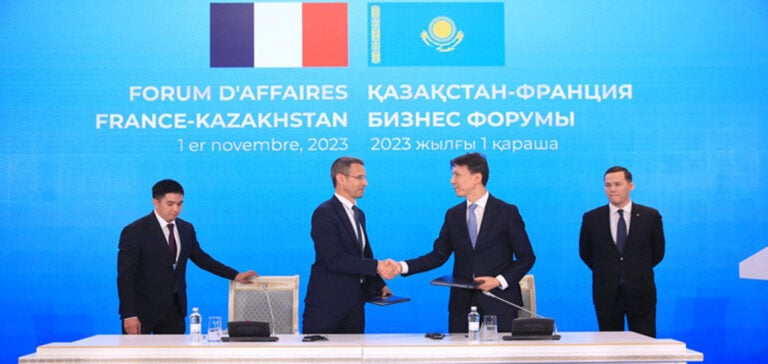Framatome, an international leader innuclear energy, signed a strategic agreement with Kazatomprom, the world’s largest uranium producer, at the France-Kazakhstan business forum. The French delegation, led by President Macron, also included Olivier Becht, Minister Delegate for Foreign Trade, Attractiveness and the French Abroad, as well as Roland Lescure, Minister Delegate for French Industry, and representatives of major French companies.
Details of the Agreement and the Official Visit
The agreement was welcomed by Bernard Fontana, CEO of Framatome, who said: “Framatome is honored to have reached this agreement with Kazatomprom. This agreement bears witness to the confidence born of our strategic and historic partnership in the realization of several projects. It also offers us further opportunities to continue and strengthen our collaboration with our Kazakh partners and to contribute to the advancement of nuclear fuel technology and performance through our decades of proven expertise and know-how.”
Perspectives on Future Collaboration
Thanks to this agreement, Framatome and Kazatomprom will be able to explore new joint projects in the nuclear fuel cycle. They also plan to collaborate in the fields of education and expert training.
Meirzhan Yussupov, Managing Director of Kazatomprom, expressed his belief in the benefits of this cooperation, saying: “Framatome is one of Kazatomprom’s important strategic partners in the development of nuclear fuel cycle projects.
This mutual desire to strengthen cooperation is based on the experience acquired by Framatome and Kazatomprom in managing complex international projects, notably the construction of the first nuclear fuel assembly manufacturing plant in Kazakhstan. Under the contract signed in 2016 between Framatome and Ulba-FA*, Framatome supplied the fuel manufacturing technology and license, as well as essential production equipment, technical documentation and personnel training, enabling the construction and certification of the new plant in Ust-Kamenogorsk.
Ulba-FA is a Kazakh-Chinese joint venture whose founders are Ulba Metallurgical Plant JSC, a subsidiary of Kazatomprom, and CGN-URC, a subsidiary of CGNPC.
This agreement with Kazatomprom strengthens Framatome’s position as a world leader in nuclear energy. This collaboration promises not only to open up new opportunities in the field of nuclear fuel, but also to strengthen bilateral relations between France and Kazakhstan in the nuclear energy sector. The complex international partnerships that Framatome and Kazatomprom have already succeeded in forging are a guarantee of fruitful cooperation in the future.






















